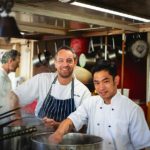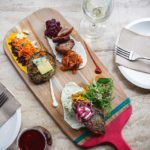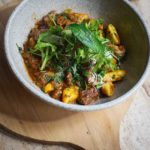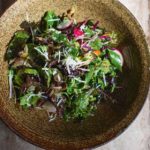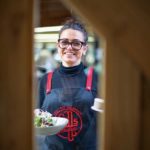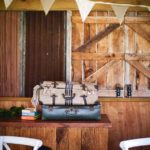The Falls Retreat: This couple spent their savings to launch a garden-to-table hidden gem in the Karangahake Gorge
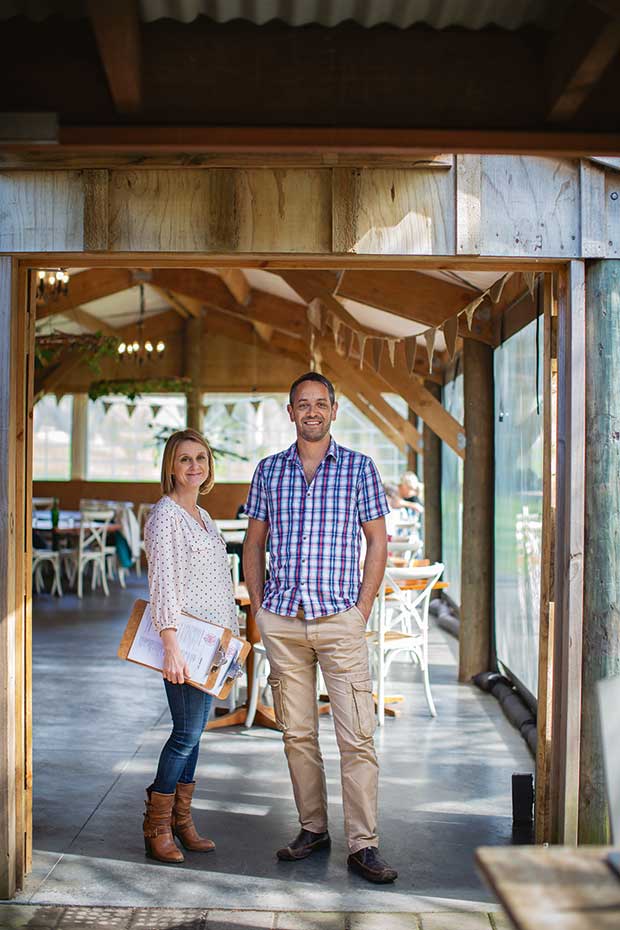
Emma Walters and Brad King are working hard to make their remote Karangahake Gorge bistro a success.
Meet the city escapees whose off-the-trail bistro feeds their need for community, family and a fine vegetable garden.
Words: Sue Hoffart Photos: Tessa Chrisp
This article was original published in the Nov/Dec 2019 of NZ Life & Leisure.
Molly King weighed little more than a small bag of supermarket potatoes when she entered the hospitality industry. Customers in a rural Waikato restaurant cooed at the tiny creature, born six weeks prematurely, asleep in a sling against the chest of her mother, the waitress.
Eight years on, Molly’s mum Emma Walters shrugs at the suggestion it was difficult to launch a family business in an out-of-the-way location six weeks after giving birth.
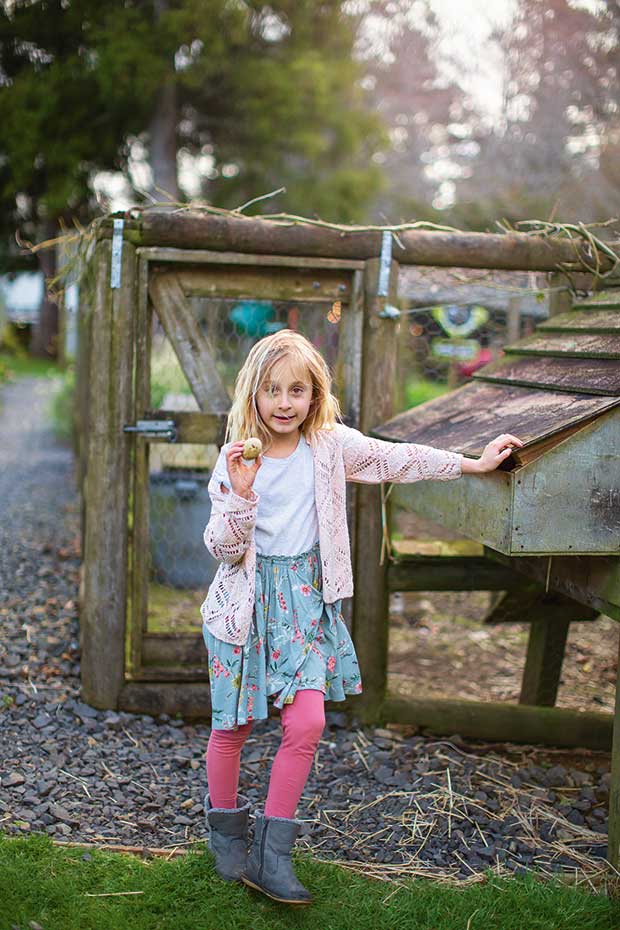
Molly King (8) helps with the eggs.
“It was easy, really,” Emma says of waitressing with a new-born strapped to her. “All Molly did was sleep and breastfeed.”
It wasn’t entirely simple. Emma was an English city girl in unfamiliar territory, learning to garden, chop firewood and parent a new baby alongside toddler Jacob while figuring out how to run a business.
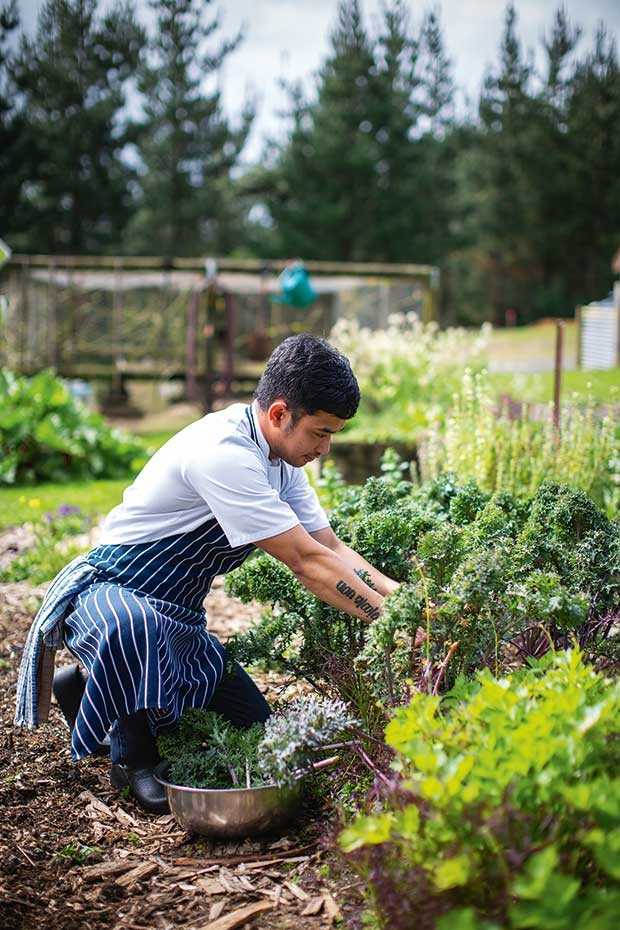
Head chef Allan Fernandez picks garden greens for the salad of the day.
She and her husband Brad King, a chef, had spent their savings and taken on a large mortgage to launch an eatery in the Karangahake Gorge beneath lofty pines, off the highway, over a bridge and up a steep driveway.
Today, Falls Retreat is busy most days of the year with guests streaming through its doors to eat, visit the small shop, attend a cooking class or a composting lesson or to stay overnight. The opening of the Hauraki Rail Trail cycleway at the foot of their property has helped drive the extraordinary growth in their business that in turn benefits locals, with up to 30 staff employed at peak times.
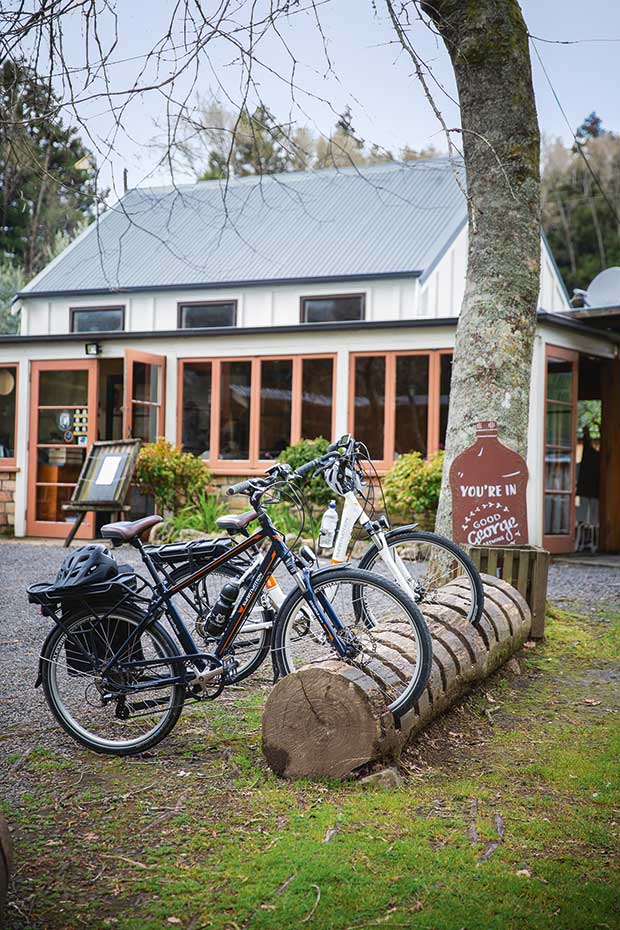
Visiting diners can park their bikes in a felled tree.
Back in the winter of 2011, when the restaurant opened, most customers stumbled on it by chance. Even so, days were full, with Brad working insane hours in the kitchen. Emma paid the accounts and dealt with mountains of laundry from the guest accommodation, the restaurant kitchen and two children.
“I cleaned the guest cottages, waitressed, did the veggie gardens and all the breakfasts. I’d have a spare half-hour when the baby was sleeping and think, ‘I’ll plant radishes.’”
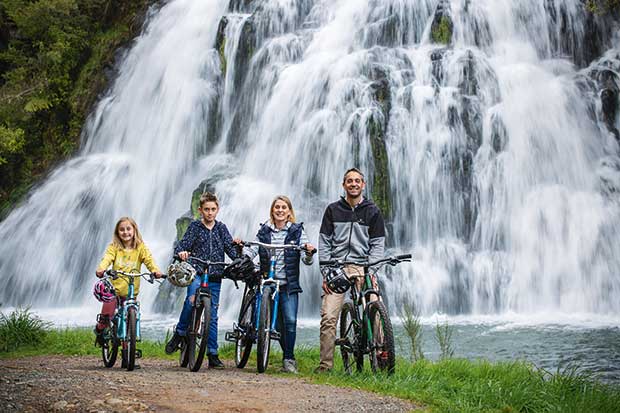
Molly, Jacob, Emma and Brad cycle from Owharoa Falls, at the bottom of their driveway.
Her early kitchen garden efforts were not entirely successful but neighbours offered strawberry cuttings and silverbeet heads, some advice and plenty of support to the hard-working young family.
These two don’t know how to work any other way. Unemployment was high in the blue-collar West Midlands town where Emma and her older brother grew up. Her parents divorced when she was five. She was an able student rather than an exceptional one.
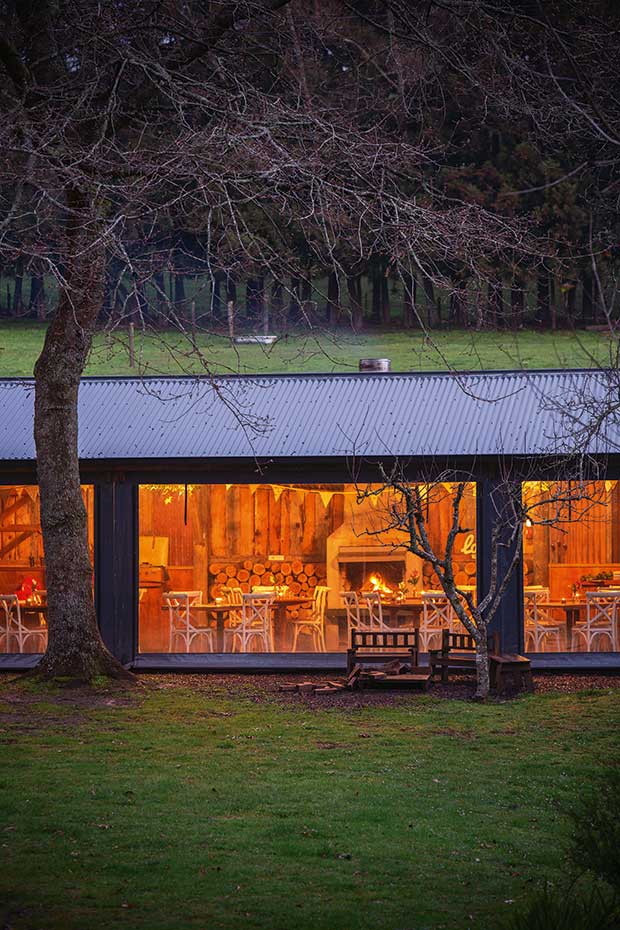
“I cook good honest food from scratch that has depth and character,” says Brad. “The majority of our menu comes from our wood-fired oven so it has an earthy quality with a lot of love and raw energy pumped into it”.
To this day, she can’t explain why she wanted to attend the academically focussed “posh” school in a neighbouring town.
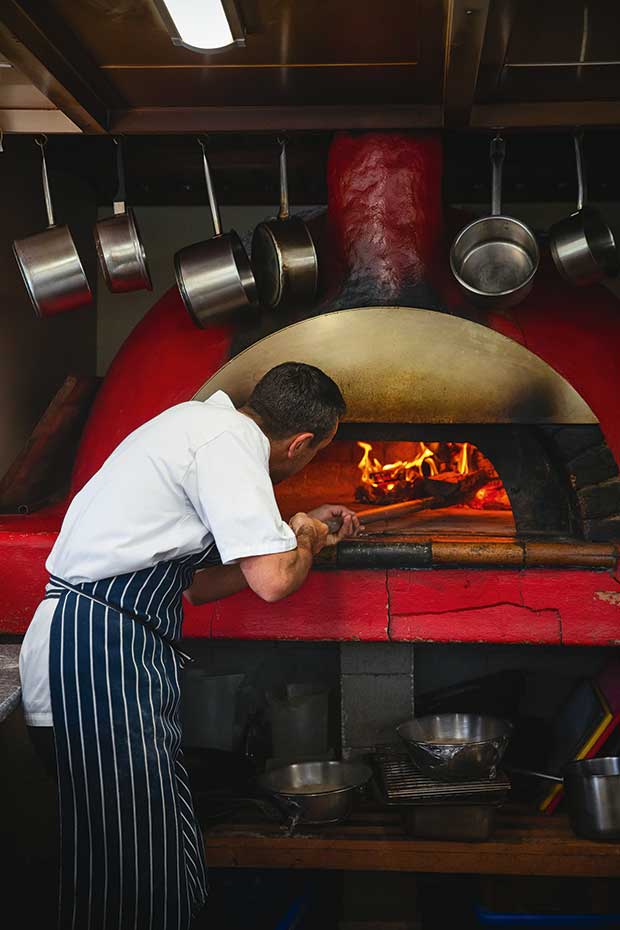
The oven was built by Brad and Emma’s uncle, Lawrence Jones. Lawrence also built the children’s playground and the pergola overlooking the waterfall. “I make my visitors work for their keep,” laughs Emma.
“But somewhere inside me was this yearning for more, so I insisted.” She was the first university graduate in her wider family – emerging with a double degree in French and business studies.
By 25, her life had settled into a predictable routine – a house purchased with a boyfriend, a steady job and nightly visits to her much-loved father. When her father died suddenly, it turned her life upside down.
“I remember saying, ‘I just can’t go on living the same life now he’s gone.’”
She split with her boyfriend, sold the house, applied for a work visa and bought an air ticket to Australia. This knee-jerk reaction led her, six years later, to a previously unimaginable life near a waterfall at the bottom of the world with a workaholic chef from Whakātane.
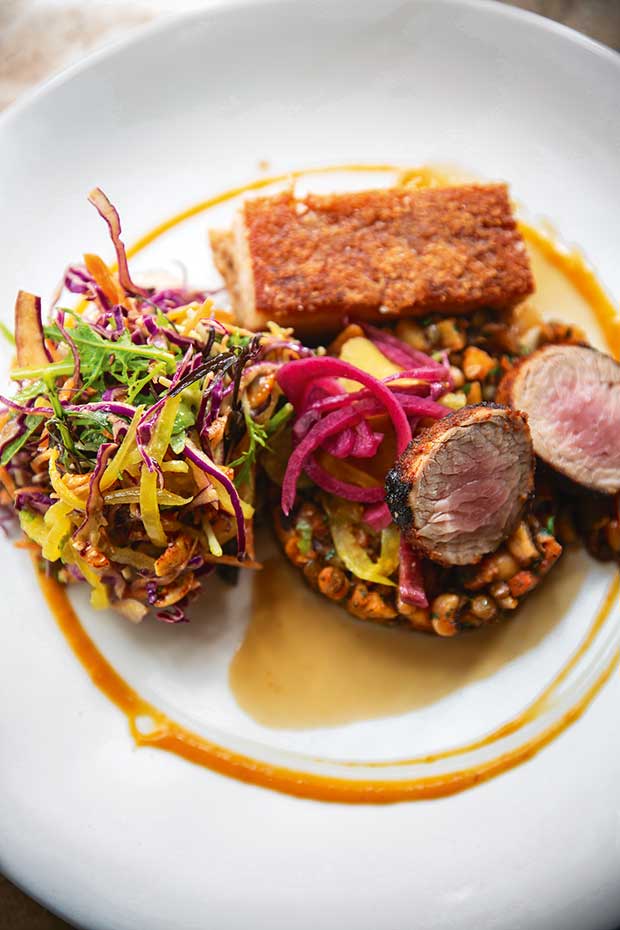
Because Brad has plenty of fire in his belly, too. He can work continuously, voluntarily, for 80 to 90 hours a week creating soul food from simple, seasonal ingredients. “Food is its own reward,” he says. “Creating dishes that give people pleasure is what drives me to come to work every day.”
He is the eldest of seven children in a tightly knit, vegetarian, Seventh Day Adventist family from the eastern Bay of Plenty. The church and his parents recognized is drive; they quickly came around to the idea of him not only working on the sabbath but also cooking meat.
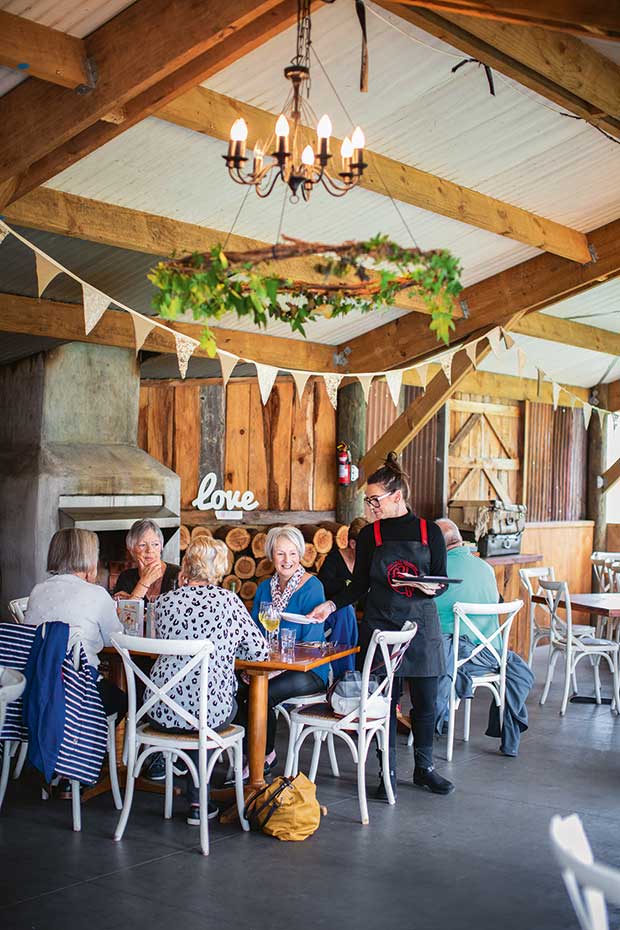
A three-bay milking shed was converted into the open-sided dining room.
Brad signed up for the Waikato Polytechnic professional cookery course as soon as he left school. “From 10, I knew exactly what I wanted to do.”
Ironically, it’s likely that family and church were responsible for sparking his ambition. Throughout his childhood, he watched his mother entertain and prepare meals for the sprawling whānau – his Ngāpuhi father has 17 siblings – and visitors from the congregation. Everyone talking at once.
- Waitress Shan Siddins.
- Rustic charm in the bistro.
“There were always 20 people rolling in to our home, and there was always food.”
Emma and Brad met at Mount Buller ski resort near Melbourne, where he was cooking and snowboarding, and she was skiing and making coffee. Slowly, over several years and with some international toing and froing, their casual holiday fling became something more profound.
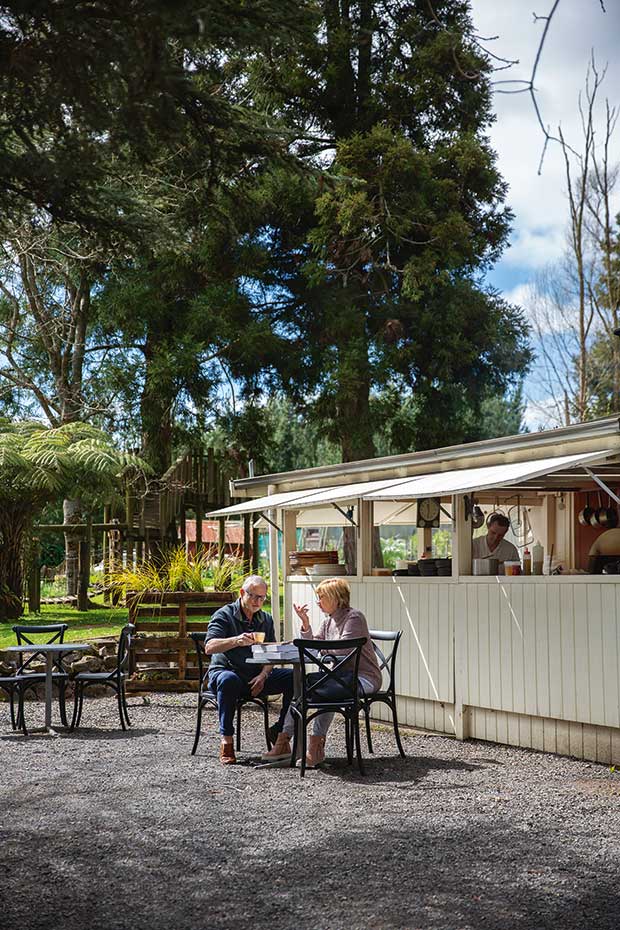
Emma insists it was his parents with whom she first fell in love.
“They’re very loving and the most down-to-earth, gorgeous family.” However, continents and oceans separated them from each of their families when they lived in Melbourne.
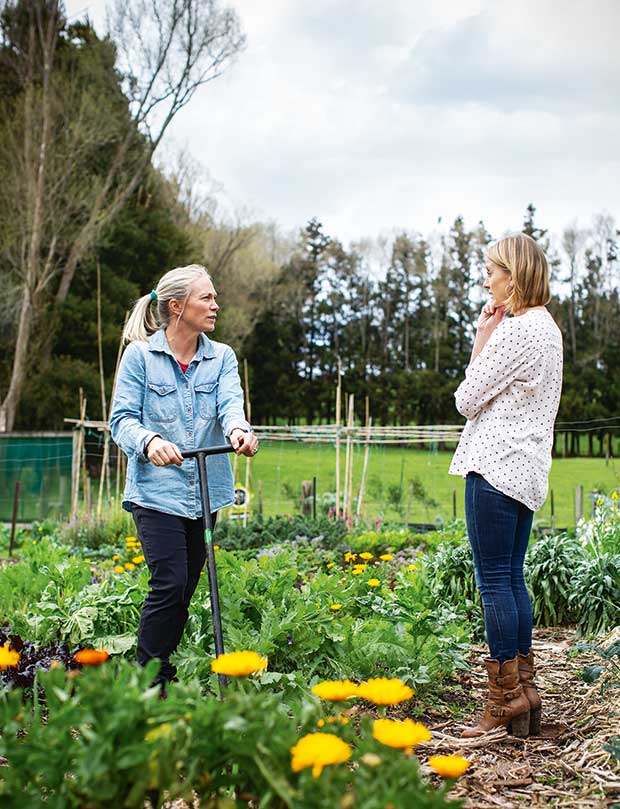
Emma with resident gardener, Nicki Murray-Orr.
Emma had a job she loved – fundraising for a social justice enterprise – and Brad was working hard managing two restaurants. Six weeks after Jacob was born, Emma returned to work.
But it was a struggle. She found herself cramming a 40-hour week into four days. Brad was at home during the day with Jacob and Emma was always rushing to get home on time for Brad to leave for his night shift.
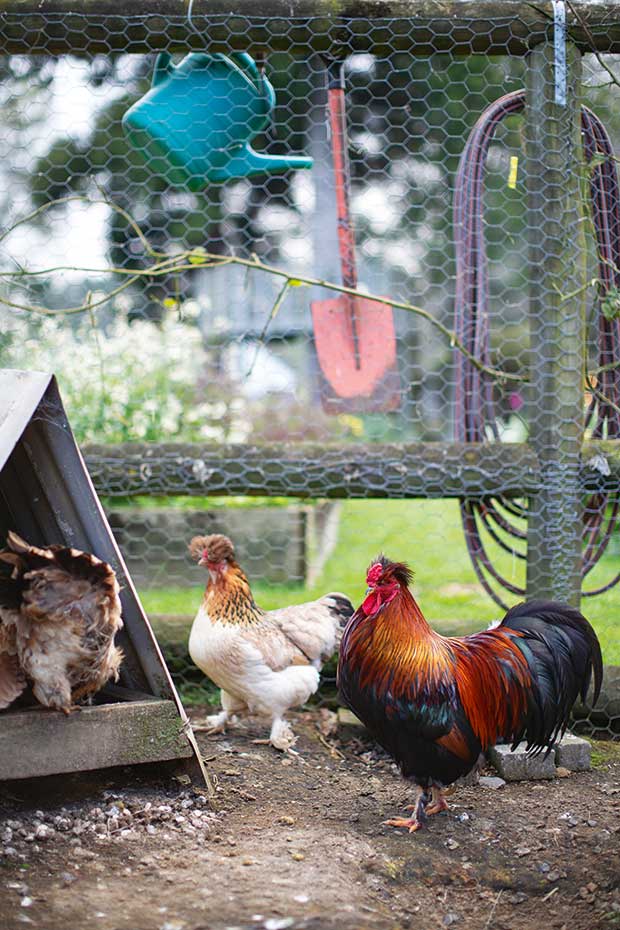
The resident egg producers.
Something had to give. The couple recalled a piece of land they had stumbled upon when holidaying in New Zealand, staying at Waihī Beach. They took a stroll through nearby Karangahake Gorge with Brad’s grandmother and stopped at a quaint café just beyond Owharoa Falls.
Over tea and scones, they spotted a credit card-sized sign advertising the business for sale together with almost five hectares of tree-covered land running down to the Ohinemuri River. “How boring to live here,” Brad scoffed.
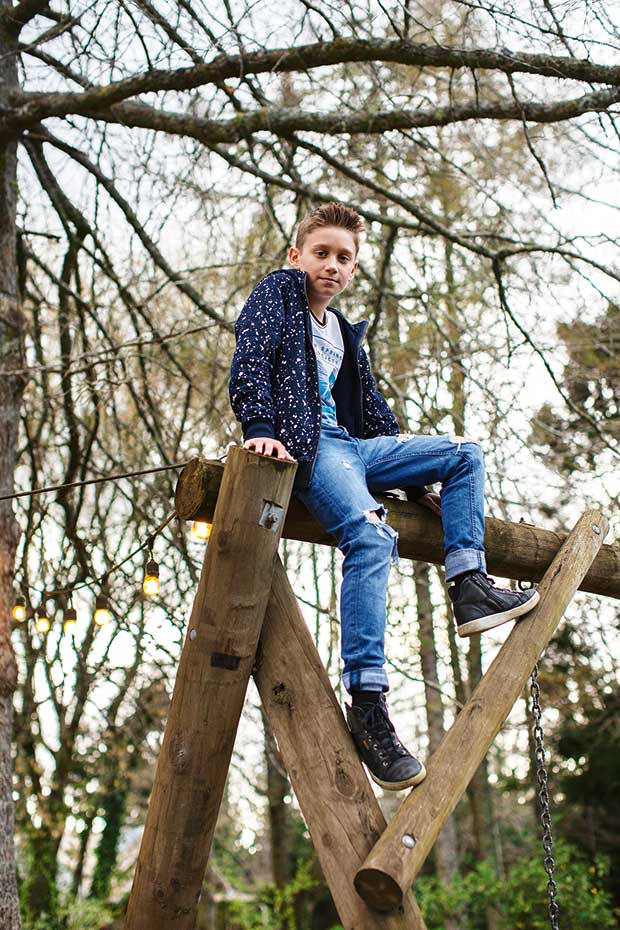
Jacob (12) earns money washing dishes and peeling potatoes. He bought an iPad and is now saving for a skateboard. He and his sister get a kick out of bringing their friends home to play among the trees,
But, thanks to the exhausting whirl of their Melbourne existence, boring began to look appealing. Could they make the property work commercially? Could they survive on one income? Could they create a better life for their family?
By 2008, the property was theirs, and they lived in the one-bedroom log cabin alongside a disused tearoom and another cottage. Brad took a job at a Waihī Beach café, leaving Emma and toddler Jacob carless at home, seven kilometres from the nearest town.
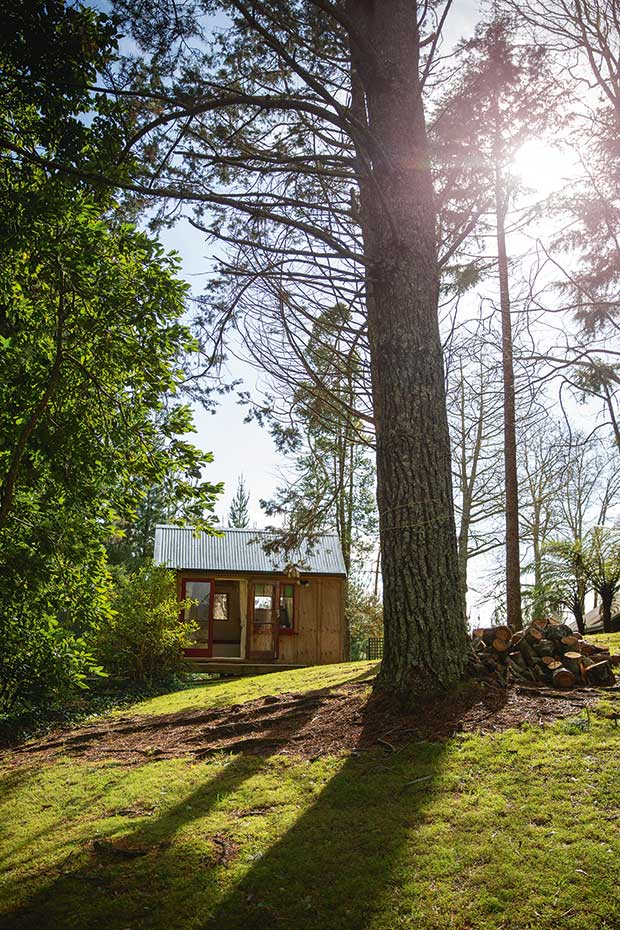
Guests can choose to stay at one of two cottages on site. The tiny “waterfall cabin” has a mezzanine bedroom area and views of the falls.
“I was here all day, and after going crazy in our hectic Melbourne life, I could breathe again. I suddenly had a feeling of community.”
It was a time of blissful motherhood, exploratory walks, meeting neighbours and working outdoors. Eventually, though, life in the slow lane began to pall. Brad had always longed to run his own bistro and, Emma reasoned, the children would see him more often if they opened a restaurant on site.
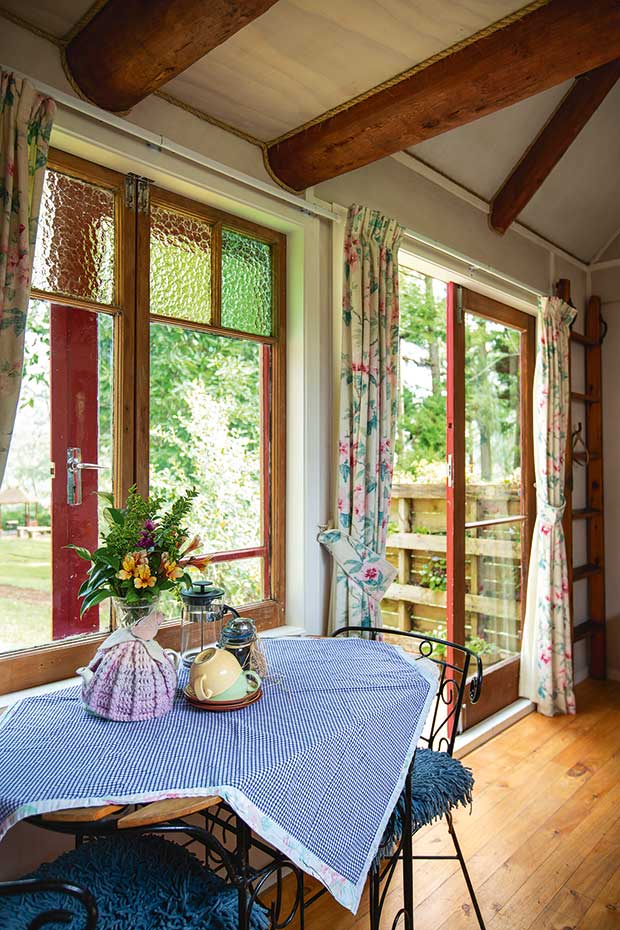
“We laugh,” says Emma. “I have a business degree, I’m the financial controller in the business. I’m the tight arse. But because of my working-class background, I do have this sense of social justice. I’m a socialist, not a capitalist.”
She began sketching out business plans, submitting council applications, taking herself off to local business courses and accumulating second-hand teaspoons and tables.
Nervously, excitedly, they opened the restaurant doors in August 2011. The following year, the Hauraki Rail Trail opened in the gorge and helped propel the business beyond their wildest imaginings.
“When we first came here, people in Auckland had never even heard of the Karangahake Gorge. It was estimated that 60,000 people would be using the Hauraki Trail within five years. They achieved that in the first year. Now they say we’re getting more than 140,0000 a year.”
A study commissioned by rail-trail management estimates those bikers generated about $24 million revenue in the region.
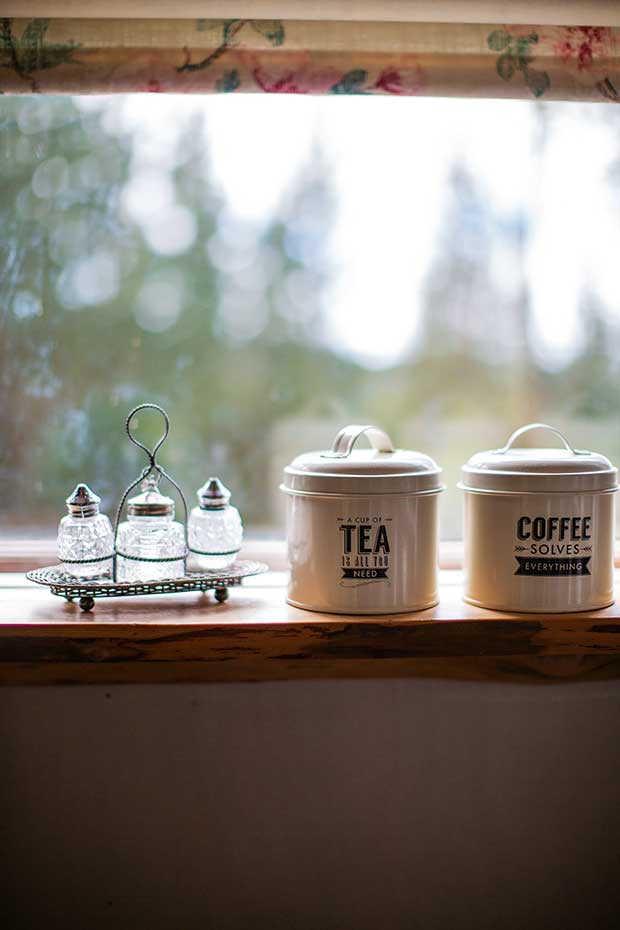
Last summer, Brad worked in the kitchen every day for three weeks straight. Tables are full most days in summer, a row of bikes propped in the felled-tree bike stand. People spill into the outdoor seating, they roam the garden, cluck over the chooks and watch their children clamber on the wooden playground.
Guests often call their thanks and compliments through the open kitchen where the chef knows his culinary artistry is only part of the picture. “It’s teamwork,” he says of Emma, “I couldn’t do it without her.”
Theirs is a diverse business these days, with plenty more than food on offer. In addition to the bistro, there’s a tiny retail shop, quaint accommodation options, productive veggie gardens and lessons in everything from fermenting to composting. Emma, then a beginner gardener, initially learned from books, neighbours and plenty of mistakes.
“Growing produce for the restaurant developed organically, if you’ll pardon the pun,” she says.
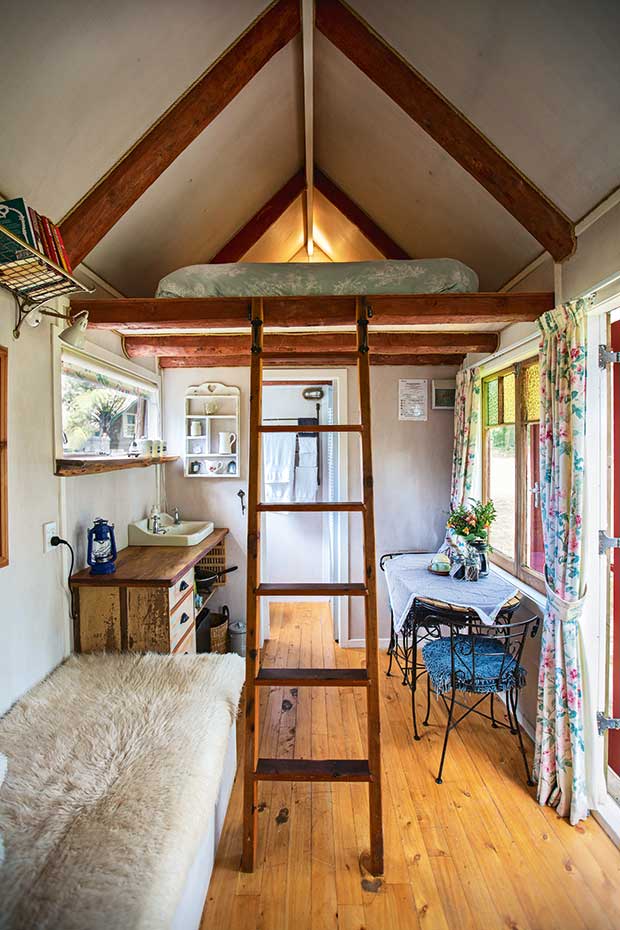
Firstly, local Nicki Murray-Orr applied for a waitressing job. But, once Emma learned of Nicki’s work history with New Zealand’s best-known heirloom seed-saver, organic gardener and author, Kay Baxter, waiting on tables morphed into gardening workshops.
Nicki helped plan and plant an orchard, and she grows additional crops for the restaurant kitchen on her own property.
Initially, the kitchen staff had to be reminded to utilize the bounty on their doorstep. So Nicki and Emma began planting more strategically, placing picking greens and herbs in front of their noses, along the walkway between the staff car park and kitchen door.
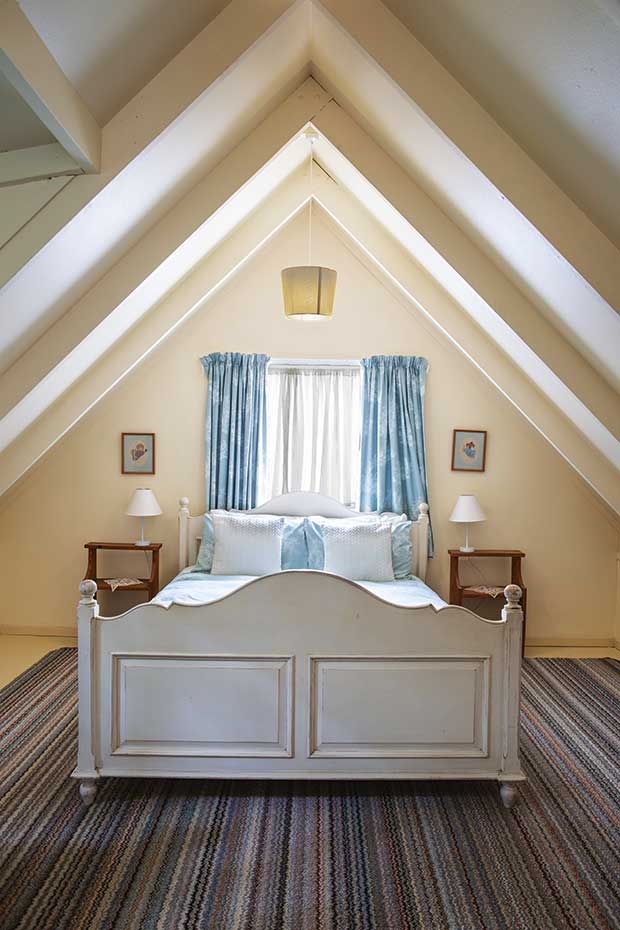
Rose Cottage is often used by relatives visiting from Britain and Whakatāne.
The Falls Retreat is now a significant local employer, and the bistro hosts community fundraisers and school-education programmes.
At their children’s nearby Waikino School, where he’s a former board chairman and she’s a current board member, Brad likes to show students how to turn school-garden produce into pizza toppings.
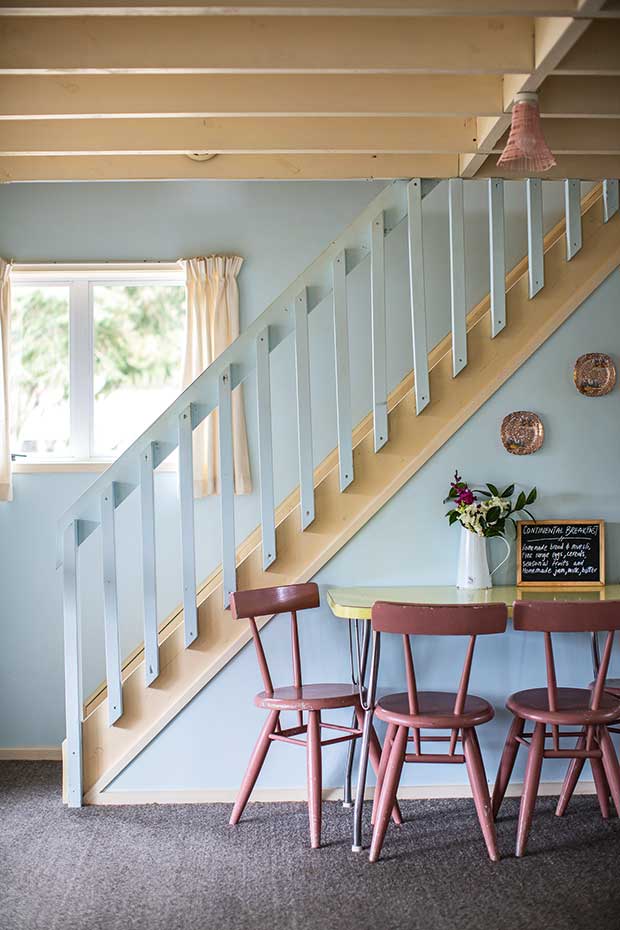
And from the start, the couple’s “barter at the bistro” concept has proved a hit; people come from Paeroa and Waihī to trade their excess backyard citrus or green beans for a coffee or dessert.
WHAT’S NEXT?
What’s next for the couple? Finding ways to work smarter, not harder.
A caravan will be fitted out as a mobile café for the cycle trail to relieve some pressure on the main kitchen. A new house has been three years in the planning, and their too-small cabin will become accommodation for the wellness retreats they hope to offer in future.
“I read yesterday how many restaurants are closing down,” Emma says. “Hospitality is a business that fills you up and burns you out. For longevity, we must diversify.”
BALANCING ACT
In terms of hours, Brad’s working weeks can veer towards triple digits. Emma claims she is too scared to tally up hers.
“But my time is super-flexible, so I can go on school trips then work at night, paying bills.
“The children certainly have a work ethic,” she says. “But we’ve tried to be quite clear that Dad is working all these hours because he loves his job and it doesn’t matter about the money.”
Having a business on the property also means that:
▶ “The staff become friends. They are like big uncles and aunties. Sometimes, when the staff leave, I cry because they’re so engaged with the kids.”
▶ Having to ensure toys don’t spill out onto the lawn or public areas. And no drum kit for music-mad Jacob thanks to the reality of having overnight guests.
▶ Getting off the property for holidays is essential. “You have to re-energize yourself to feel passionate about it again.”
MORE HERE:
Love this story? Subscribe now!
 This article first appeared in NZ Life & Leisure Magazine.
This article first appeared in NZ Life & Leisure Magazine.
